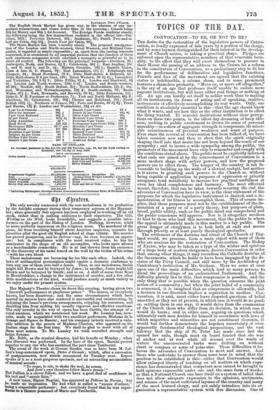'Of tratrts.
The only novelty connected with the new melodrama is its produetion by the Adelphi company during their temporary sojourn at the Haymar- ket ; since generally that sojourn has been employed in working off an old stock, rather than in making additions to their repertoire. The
Writing on the Wag looks formidable, and suggests a possible inter- ference on the part of the Bishop of London. Nothing, however, cohld be more perfectly innocuous on the religious score. The murderer of the piece, far from troubling himself about Assyrian impieties, commits his atrocities after the good old English school of stage villany. His murder has proved prosperous, and he thrives—nay, be even becomes an oppres- sor; but, in compliance with the moat received rules, he has his annoyance in the shape of an old accomplice, who looks upon silence as a merchantable commodity. He is at last thrown from his eminence by the discovery of his name traced on the wall by the victim of his crime —with his own blood.
These melodramas are becoming far too like each other. Indeed, the laws of arithmetical permutation might enable a dramatic craftsman to turn any one of them into half a dozen. Thus, in one melodrama, Smith might kill Brown and be betrayed by Jones ; in another, Jones might kill Brown and be betrayed by Smith; and so on. A shift of scene from Kent to Herefordshire, a change in the instrument of murder, and a few other little modifications of the kind, would produce nearly as much variety as we enjoy under the present system.


























 Previous page
Previous page